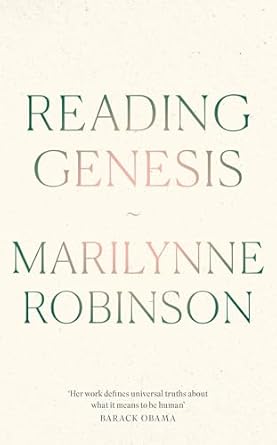Reading Genesis by Marilynne Robinson
'Brings her unique experiences as a novelist to bear on the nature of the text, while sharing her insights as a female writer on the importance of women'
 Reading Genesis
Reading Genesis
By Marilynne Robinson
Virago
ISBN: 9780349018744
Reviewed by Trevor Stammers
Marilynne Robinson, reportedly Barack Obama’s favourite novelist, is probably best known as the Pulitzer Prize-winning author of Gilead. Though she refers to her Calvinist faith in some of her non-fiction writing (as well as permeating Gilead) this is her first Bible commentary and the book includes the entire text of Genesis, increasing the page count by well over a hundred to 344.
It is a joy to read simply because she writes so beautifully, but she also writes with obvious understanding and respect for the text which she often refers to as ‘sacred’.
She also brings (at least in my limited experience of commentaries on Genesis) her unique experiences as a novelist to bear on the nature of the text, while sharing her insights as a female writer on the importance of women in a book that is generally considered to be patriarchal in both subject matter and tone.
In relation for example to the theory suggesting the early chapters of Genesis are derived from ‘pagan tales’, she promises ‘I will look at the ways in which these texts are comparable, and the ways in which these points of comparison establish profound differences in the conceptions of the very systems of being articulated by these narratives.’ (p10)
After a brief synopsis of the style of ‘two great Babylonian narratives, the Epic of Gilgamesh and the Enuma Elish’ (p11) she concludes, “This could hardly be more remote from the infinite serenity of ‘let there be … and there was’. (p12). She adds later ‘In theory I suppose, these narratives could be more dissimilar, though in fact this is hard to imagine.’ (p32).
Her respect for the text (though she is far from naive about it) continues right though to the end where she proclaims ‘The whole great literature of Scripture unfolding over centuries, will proceed on the terms established in this book. So Genesis is carried forward in the law, in the psalms, in the prophets, itself a spectacular burst of light without antecedent but with a universe of consequences.’ (p224)
The other feature unique in my experience is the way that Robinson focuses on the role of women in the text.
Just a couple of examples will suffice here. First in relation to Sarah’s maid Hagar, Robinson comments ‘Readers can feel that Hagar is unvalued because she is a woman, a maid, a foreigner and these are indeed the conditions that make her vulnerable to mistreatment by Sarai and Abram. But what actually matters is the value the text finds in her and in her life, which humble as it may seem to us, can be called her destiny.’(p87) Never before have I noticed that ‘Hagar is important and is recognised as important in figuring in the first of the biblical annunciations.’ (p86).
A second woman whose courage in the face of gross ill-treatment by men is highlighted, namely Tamar. She ‘is determined to carry our her widow’s obligation to her husbands, even though both were so offensive to God that….He slew them. Tamar does what she can for them at obvious risk to herself and providence rewards this twice-widowed Canaanite woman with two sons..’
One of those sons - Perez - is named along with Tamar in the genealogy of Jesus in Matthew’s gospel (Matt 1:2).
Readers looking for insights into the Genesis text which are overlooked or glossed over elsewhere will find much of interest here, and see these foundational stories for three major world religions in a far clearer light than before.
Dr Trevor Stammers is an Honorary Senior Research Fellow, Spurgeon’s College
Baptist Times, 02/05/2025